
EPIDEMIOLOGY AND INFECTION
Scope & Guideline
Empowering Research for a Healthier Tomorrow
Introduction
Aims and Scopes
- Epidemiological Studies:
The journal publishes original research that investigates the distribution and determinants of infectious diseases in populations, employing various epidemiological methodologies including cohort studies, case-control studies, and cross-sectional surveys. - Infectious Disease Surveillance:
Research focusing on the surveillance of infectious diseases, including outbreak detection and monitoring of disease patterns over time, is a core area of the journal. This includes studies that utilize innovative surveillance techniques such as genomic epidemiology and environmental monitoring. - Public Health Interventions:
The journal emphasizes studies assessing the impact of public health interventions on infectious disease transmission, including vaccination programs, health education, and policy evaluations aimed at controlling outbreaks. - Microbial Resistance and Pathogen Characterization:
Research on antimicrobial resistance, pathogen characterization, and the molecular epidemiology of infectious agents are significant themes, reflecting the journal's commitment to understanding and combating resistance in clinical settings. - Global Health Perspectives:
The journal includes studies that examine infectious diseases from a global health perspective, addressing issues such as health disparities, the impact of socio-economic factors on disease transmission, and the responses to pandemics across different regions.
Trending and Emerging
- COVID-19 Research and Variants:
The journal has seen a surge in studies related to COVID-19, particularly concerning the epidemiology of new variants, vaccine effectiveness, and long-term health outcomes related to the virus. This trend underscores the pandemic's ongoing relevance in public health research. - One Health Approach:
Research integrating the One Health perspective, which recognizes the interconnectedness of human, animal, and environmental health, is emerging as a vital theme. This reflects a growing understanding of zoonotic diseases and their implications for public health. - Environmental and Climate Influences on Infectious Diseases:
There is an increasing number of studies examining how environmental factors and climate change impact the transmission dynamics of infectious diseases, highlighting the need for interdisciplinary approaches in epidemiological research. - Digital Health and Surveillance Innovations:
The rise of digital health technologies and innovative surveillance methods, such as the use of mobile applications and big data analytics for tracking disease spread, is a notable trend in the journal's publications. - Mental Health Impacts of Infectious Diseases:
Emerging research exploring the mental health consequences of infectious disease outbreaks, particularly in the context of COVID-19, signifies a growing recognition of the psychological aspects of public health.
Declining or Waning
- Classical Infectious Disease Models:
There is a noticeable decline in the publication of studies relying on traditional infectious disease modeling approaches. As the field evolves, there is a growing preference for more sophisticated and data-driven models that incorporate real-time data and machine learning techniques. - Focus on Non-Communicable Diseases:
Research that previously intersected with infectious diseases, particularly studies examining the relationships between infectious diseases and non-communicable diseases, is becoming less frequent as the journal concentrates more on acute infectious disease outbreaks. - Historical Epidemiological Studies:
The publication of historical epidemiological studies that analyze past outbreaks or disease trends has decreased, as current research is increasingly focused on contemporary challenges, particularly those arising from the COVID-19 pandemic. - Localized Infection Studies:
Studies focusing exclusively on localized infections without broader implications or connections to global epidemiological trends are less common, with a shift towards research that highlights global health perspectives and interconnectedness. - Traditional Vaccination Efficacy Studies:
There is a waning interest in basic studies solely assessing the efficacy of vaccines, as the journal now favors research that explores complex interactions between vaccination, population dynamics, and emerging variants.
Similar Journals
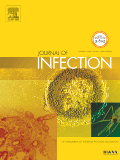
JOURNAL OF INFECTION
Pioneering Insights into Infectious ProcessesJOURNAL OF INFECTION is a premier academic publication in the fields of infectious diseases and medical microbiology, published by W B SAUNDERS CO LTD. With a profound impact factor and established since 1979, this journal serves as a crucial resource for researchers, clinicians, and policy-makers seeking to advance knowledge and understanding of infectious processes and their management. The JOURNAL OF INFECTION holds an impressive position in the academic hierarchy as reflected by its Q1 quartile rankings in both Infectious Diseases and Microbiology (medical) for 2023, further underscored by its Scopus rankings: #2 in Medical Microbiology and #5 in Medical Infectious Diseases, placing it in the 98th percentile overall. While the journal does not offer Open Access options, it provides a comprehensive outlet for innovative research, reviews, and clinical insights that drive the field forward. Published from the United Kingdom, it attracts a global readership keen on staying at the forefront of infectious disease research, making it an essential addition to any academic and clinical library.

Asia-Pacific Journal of Public Health
Empowering health outcomes through rigorous research.Asia-Pacific Journal of Public Health, published by SAGE Publications Inc, is a leading platform for disseminating scholarly research in the field of public health. With an impressive scope that spans from the late 1980s to the present, the journal offers a wealth of articles that address critical issues faced by diverse populations in the Asia-Pacific region. Categorized in the Q3 quartile for both Medicine (miscellaneous) and Public Health, Environmental and Occupational Health, it holds a significant position within its field, ranked 310 out of 665 in the Scopus database. Researchers and professionals have access to valuable insights that inform public health policy and practice, making this journal an essential resource for those aiming to enhance health outcomes in the region. While not currently open access, the journal's rigorous peer-review process ensures the integrity and relevance of its content. As the landscape of public health continues to evolve, the Asia-Pacific Journal of Public Health remains a vital resource for advancing knowledge, fostering collaboration, and promoting a healthier society.
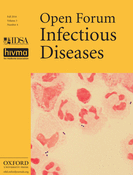
Open Forum Infectious Diseases
Bridging gaps in knowledge for better health outcomes.Open Forum Infectious Diseases (ISSN: 2328-8957; E-ISSN: 2328-8957) is a leading open-access journal published by Oxford University Press, dedicated to advancing the field of infectious diseases. Since its inception in 2014, the journal has provided a platform for researchers to disseminate impactful findings in a rapidly evolving domain, achieving a remarkable Q1 ranking in both the Infectious Diseases and Oncology categories as of 2023. The journal encourages rigorous and innovative research, contributing significantly to global health discussions and informing best practices in clinical settings. As an open-access journal, it ensures that its content is accessible to a wide audience, fostering collaboration and knowledge sharing among researchers, professionals, and students alike. Positioned in the heart of the United States, Open Forum Infectious Diseases serves as a critical resource for the academic community, and its continued commitment to quality and relevance secures its status as an essential publication in the field.
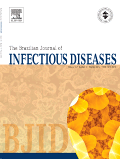
Brazilian Journal of Infectious Diseases
Elevating the discourse on infectious diseases globally.The Brazilian Journal of Infectious Diseases, published by Elsevier Brazil, is a premier open-access journal dedicated to advancing research and clinical practice in the field of infectious diseases. Since its inception in 2001, this journal has been pivotal in disseminating innovative studies and reviews that inform healthcare professionals and researchers alike. With an impressive impact factor reflected by its ranking in the second quartile for Infectious Diseases and third quartile for Medical Microbiology in 2023, the journal ranks #127 out of 344 in medicine – infectious diseases and #61 out of 140 in medical microbiology, showcasing its reputable standing in the scientific community. The Brazilian Journal of Infectious Diseases invites contributions that highlight significant findings, novel methodologies, and critical reviews aimed at enhancing patient care and public health initiatives. With an international readership and a focus on pressing issues in infectious diseases, it serves as an essential platform for knowledge exchange and collaboration among scholars and practitioners across Brazil and beyond. By reinforcing the importance of open access to scientific literature, this journal not only promotes transparency but also enhances the global discourse surrounding infectious diseases.
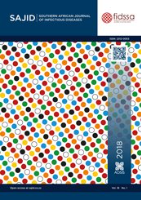
Southern African Journal of Infectious Diseases
Connecting knowledge to combat infectious diseases.Southern African Journal of Infectious Diseases is a pivotal platform for the dissemination and advancement of research in the field of infectious diseases, with a particular focus on issues significant to the Southern African region. Published by AOSIS, this Open Access journal has been committed to providing accessible scholarly content since 2016, enabling researchers and practitioners to stay updated with the latest developments in infectious disease epidemiology, prevention, and management. With the ISSN 2312-0053 and E-ISSN 2313-1810, the journal invites submissions that explore diverse topics, including but not limited to clinical studies, public health policies, and innovative treatment methodologies. The Southern African Journal of Infectious Diseases is an essential resource for academics, professionals, and students dedicated to combating infectious diseases and improving health outcomes in the region, fostering a collaborative approach to research and knowledge sharing.

Journal of Global Infectious Diseases
Connecting researchers to combat infectious diseases.Journal of Global Infectious Diseases, published by Wolters Kluwer Medknow Publications, serves as a pivotal resource in the field of infectious diseases, offering insightful research and critical analyses that contribute to global health discourse. Since its inception as an Open Access journal in 2009, it has aimed to disseminate knowledge on various facets of infectious diseases, fostering collaboration among researchers, clinicians, and public health professionals. With an impact factor indicative of its growing significance—ranked in the Q3 category of Infectious Diseases for 2023—this journal publishes a diverse range of studies, from basic science to clinical applications. Its dedicated contributions help address pressing health challenges and enhance knowledge sharing in an era where infectious diseases pose significant threats worldwide. Based in India, the journal not only highlights regional health issues but also connects to the broader global landscape, making it an essential platform for anyone interested in advancing the field.

Journal of Pathogens
Transforming Insights into Actionable KnowledgeJournal of Pathogens is a premier peer-reviewed journal published by HINDAWI LTD, focusing on the critical field of microbiology, infectious diseases, and the mechanisms of pathogen interactions with hosts. Since its inception in 2011 as an Open Access journal, it has aimed to provide a platform for high-quality research articles, reviews, and case studies that enhance our understanding of pathogenesis and advance the science of disease control. With its commitment to making research freely accessible, the journal attracts a global audience of researchers, professionals, and graduate students keen on exploring innovative findings and applications in the study of pathogens. While the journal does not currently have an established H-index or category quartiles, its relevance and importance in the field continue to grow as it seeks to bridge knowledge gaps and facilitate impactful discussions in infectious disease research. Located at Adam House, 3rd Floor, 1 Fitzroy Square, London W1T 5HF, England, the Journal of Pathogens invites submissions that contribute to the ever-evolving landscape of pathogen research and public health.

IJID Regions
Championing open access to transform public health practices.IJID Regions is a pioneering open access journal published by Elsevier, focusing on the critical fields of epidemiology, infectious diseases, and public health. Established in 2021, the journal aims to provide a platform for disseminating high-quality, innovative research that addresses pressing health issues and informs evidence-based practices in communities around the globe. With its impact factors reflecting a Tier Q2 and Q3 ranking in various medical subcategories on the Scopus platform, IJID Regions is positioned as a valuable resource for researchers, health professionals, and policy-makers striving to enhance public health outcomes. This journal not only champions open access since its inception, promoting the free flow of information, but also welcomes contributions that shed light on contemporary challenges in environmental and occupational health. Its commitment to fostering dialogue and collaboration in the health sciences is paramount, making it an essential read for those engaged in advancing public health knowledge and initiatives.
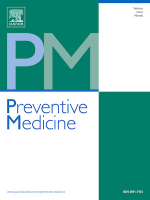
Preventive Medicine
Shaping tomorrow's public health through rigorous research.Preventive Medicine is a premier academic journal published by Academic Press Inc Elsevier Science, renowned for its influential contributions to the fields of Epidemiology and Public Health. Since its inception in 1946 and through its dedicated issues leading into 2024, the journal has established itself as a leading platform for cutting-edge research, boasting impressive Scopus rankings, with a notable Q1 status across relevant categories. This journal provides an essential forum for scholars, practitioners, and policy-makers interested in the prevention of diseases and the promotion of health within populations. With each issue, it disseminates valuable insights on preventive strategies, health behaviors, and epidemiological trends, making it crucial for anyone invested in the advancement of public health sciences. The journal does not offer open access options, ensuring that content remains relevant and targeted to its scholarly audience. Given its valuable contributions and recognition in the academic community, Preventive Medicine continues to play a pivotal role in shaping evidence-based approaches to health promotion and disease prevention in modern societal contexts.

Biosafety and Health
Innovating solutions for a safer, healthier world.Biosafety and Health is a leading peer-reviewed journal published by ELSEVIER, dedicated to advancing knowledge and practice in the fields of biotechnology, infectious diseases, microbiology, and public health. With an ISSN of 2096-6962 and an E-ISSN of 2590-0536, this Open Access journal has been accessible to the global research community since 2019, fostering collaboration and innovation from its base in the Netherlands. Ranked Q2 in multiple categories according to the latest metrics, including Biotechnology and Microbiology (medical), it stands as a testament to high-quality, impactful research that influences clinical and environmental practices. The journal has achieved substantial recognition in various medical fields, ranking in the 88th percentile for Public Health, Environmental and Occupational Health, and the 78th percentile for Infectious Diseases. Researchers and practitioners seeking to contribute to this evolving domain are encouraged to submit their findings, as the journal aims to promote interdisciplinary dialogue and address pressing global health challenges.